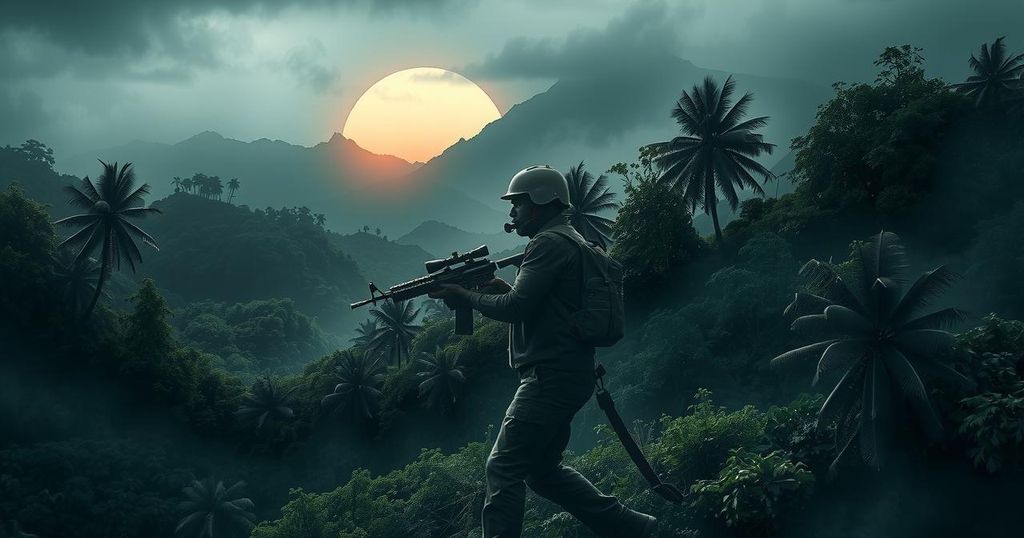The M23 rebels, backed by Rwanda, have captured Goma, escalating conflict in the DRC and resulting in civilian evacuations and the deaths of multiple peacekeepers. The group’s actions have generated condemnation from Western nations, although Rwanda denies involvement. The ongoing conflict, rooted in historical ethnic tensions and militia violence post-genocide, has displaced many and raised concerns over mineral exploitation in the region.
Recent escalations have seen Congolese rebels, backed by Rwanda, capturing the mineral-rich city of Goma, prompting an exodus of civilians. The M23 rebel group has expanded its reach along the Rwandan border, claiming responsibility for recent gains, including Goma. Western nations such as Britain and France have condemned these actions, urging Rwanda to cease its support for the rebels, which Kigali disputes.
The roots of the conflict in eastern Democratic Republic of Congo (DRC) date back several decades, alongside the complex history of various rebel factions and foreign interventions. Over the span of three decades, approximately six million individuals have lost their lives due to violence in this region, which is also home to one of the world’s largest displaced populations. The turmoil intensified following the 1994 Rwandan genocide, leading to mass migrations and the establishment of militia groups in eastern DRC.
Following the genocide, Rwanda, Uganda, and Angola intervened in eastern DRC to combat militia factions, establishing a conflict notorious as Africa’s World War. United Nations peacekeeping forces were deployed in 1999, as accusations against Kigali concerning support for rebel groups like M23 emerged. While Rwanda cites the ongoing threat of Hutu militia groups in DRC, critics argue that the nation’s true intention lies in securing mineral riches in the area.
M23, which stands for March 23, 2009, evolved from complaints about the Congolese government violating a peace agreement that concluded a Tutsi-led uprising. The group seeks to defend Tutsi interests against Hutu militias, including the Democratic Forces for the Liberation of Rwanda (FDLR). They previously captured Goma in 2012 but were subsequently pushed back due to international pressure and re-emerged in 2022 to challenge Goma once more.
For over a year, M23 has controlled Rubaya, a significant coltan mining area in Congo, generating considerable revenue through production taxes. Coltan is vital for smartphone production, and the group’s advance into Goma is suspected to be motivated by desires to exploit other local resources such as gold, diamonds, and cassiterite.
The ongoing conflict has displaced numerous civilians and strained diplomatic relations between the DRC and Rwanda. Sustained violence has resulted in bomb attacks and significant casualties, including deaths among peacekeeping forces. The latest hostilities have escalated, with M23 capturing Sake, a vital location near Goma, and further intensified military confrontations leading to Congo severing diplomatic ties with Rwanda.
Condemnations of Rwanda’s actions have emerged from the United States, Britain, and France, criticizing its supportive role for M23. James Kariuki, the UK’s deputy permanent representative to the UN, stated, “M23 attacks on peacekeepers with support from the RDF must stop immediately.” Tensions are complicated further by recent attempts to foster cooperation with Rwanda, highlighting a multifaceted diplomatic landscape.
The conflict involving Rwandan-backed M23 rebels in the Democratic Republic of Congo is deeply rooted in historical ethnic tensions and violence. The DRC has been plagued by instability since the 1994 Rwandan genocide, which resulted in mass displacements and the establishment of various militia factions. Rwanda’s continued involvement in DRC’s conflicts raises questions about its intentions, particularly regarding mineral wealth that the region possesses and the management of ethnic strife that has characterized the region’s past.
The persistence of violence and territorial gains by M23 rebels emphasize the complexity of the conflict in the DRC, revealing the interplay of historical grievances, foreign interventions, and resource exploitation. The international community’s reaction underscores the urgent need for diplomatic resolutions to address not only the immediate humanitarian crisis but also the underlying causes of instability in the region. Continuous scrutiny of Rwanda’s role and responsibilities will be essential in finding a sustainable peace.
Original Source: www.telegraph.co.uk






